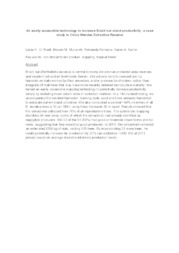An easily accessible technology to increase Brazil nut stand productivity: a case study in Chico Mendes Extractive Reserve.
An easily accessible technology to increase Brazil nut stand productivity: a case study in Chico Mendes Extractive Reserve.
Resumo: Brazil nut (Bertholletia excelsa) is central to many Amazonian protected area reserves and resident extractivist livelihoods therein. Extractivists tend to concentrate nut harvests on trails worked by their ancestors and/or previous landholders, rather than integrate off-trail trees that may have more recently entered reproductive maturity. We tested an easily accessible mapping technology to potentially increase productivity simply by including more extant trees in collection routines. In a 145-ha landholding, we accompanied the resident harvester, tracking trails used and trees annually harvested to estimate current stand utilization. We also conducted a parallel 100% inventory of all B. excelsa trees ≥ 10 cm DBH, using linear transects 50 m apart. Results showed that the extractivist collected from 70% of all reproductive trees. The systematic mapping identified 54 new trees, some of which the extractivist had already identified as negligible producers. Still 32 of the 54 (59%) had good or tolerable crown forms and no vines, suggesting that they would be good producers. In 2013, this extractivist collected an estimated 3586 kg of nuts, visiting 125 trees. By incorporating 32 more trees, he could potentially increase his production by 27% (an additional ~USD 600 at 2013 prices) based on average diameter-informed production levels.
Ano de publicação: 2014
Tipo de publicação: Resumo em anais e proceedings
Unidade: Embrapa Acre
Palavras-chave: Acre, Bertholletia Excelsa, Castanheira, Produtividade, Produtos floretais não madeireiros, RESEX Chico Mendes
Observações
1 - Por padrão são exibidas publicações dos últimos 20 anos. Para encontrar publicações mais antigas, configure o filtro ano de publicação, colocando o ano a partir do qual você deseja encontrar publicações. O filtro está na coluna da esquerda na busca acima.
2 - Para ler algumas publicações da Embrapa (apenas as que estão em formato ePub), é necessário ter, no celular ou computador, um desses softwares gratuitos. Sistemas Android: Google Play Livros; IOS: iBooks; Windows e Linux: software Calibre.
Acesse outras publicações
Acesse a Base de Dados da Pesquisa Agropecuária (BDPA) para consultar o acervo completo das bibliotecas da Embrapa.

